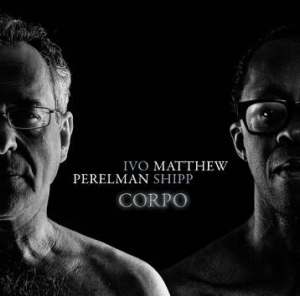
 Brazilian saxophonist Ivo Perelman & American pianist Matthew Shipp have an exceptionally close working association. Corpo is their 15th collaboration on Leo Records since 2012 alone, and Shipp has described it as: “the ultimate coming together of everything Ivo and I have been working on…apotheosis of the Perelman/Shipp duo (language and) cosmos.”
Brazilian saxophonist Ivo Perelman & American pianist Matthew Shipp have an exceptionally close working association. Corpo is their 15th collaboration on Leo Records since 2012 alone, and Shipp has described it as: “the ultimate coming together of everything Ivo and I have been working on…apotheosis of the Perelman/Shipp duo (language and) cosmos.”
Shipp’s relationship with veteran drummer Bobby Kapp (b. 1942) carries less historic weight, and that has its up-side. Shipp is still Shipp, of course – always vibrantly imperious – and the music on Cactus (Northern Spy) is every bit as dynamic as his duo with Perelman, but it’s a more brittle and frisky, less compacted dynamic.
Kapp was active in the underground jazz movement in 60s New York, and played on a handful of choice recordings of the time: one half of Brown’s Three for Shepp (Impulse!, 1966), Gato Barbieri’s In Search of the Mystery (1967) and Noah Howard’s At Judson Hall (1968)—both on ESP—and Dave Burrell’s High (Douglas, 1969).
At some point, however, Kapp relocated from New York to the artist’s colony of San Miguel de Allende, Mexico, and effectively dropped off-radar. He recently recorded two albums of piano jazz standards with the unpromisingly-named Fine Wine Trio, but a brief reunion with Howard before the latter’s death in 2010 was a more accurate pointer to 2014’s Kapp ‘comeback’ album Themes 4 Transmutation, on which Shipp played alongside bassist Tyler Mitchell and saxophonist/flautist Ras Moshe.
Kapp has an economical, pan-rhythmic style firmly rooted in a tradition that accommodates both Shelly Manne and Sunny Murray. He’s typically busy, probing and gestural – all light snare and brisk cymbals.
Shipp, who is 20 odd years the drummer’s junior, rightly says that Kapp: “combines the best of old school drumming with a real feel for pulse and breaking the circle that exists in the avant-garde. He can open the beat up in a way where you can flow with the wave and never lose the line.”
Shipp’s own lines have a more ineluctable fluidity, but he’s always diligent, and ready, like water, to ply unexpected directions of frictionless accord with the drummer’s agitations.
Of course these are reductions. While Knapp as a habit of breaking into briskly spry rhythm, Shipp’s style can be angular. The two play off each other’s changeable moods.
The album’s opening cuts and “Good Wood” are restlessly, ceaselessly inventive and indubitably musical. On the latter – a piece top-and-tailed by variegated Knapp percussion solos, Shipp seems to get right under the skin of his own style.
“Snow Storm Coming” flows on from “Good Wood” with heightened drama and dynamic contrast, and incidental contrasts abound everywhere. Where “During” has Shipp at his most lyrical and darkly romantic, “The 3rd Sound” is skeletal and deliberately fitful, and “Money” is jaunty, with Shipp, uncommonly loose, concocting a light melodic rain of one note hits as Knapp essays a loose swing time with brushes.
The title track is the album’s most thoughtful, original and least deterministic piece, and perhaps the choice pick after “Good Wood”.
Curiously, the CD cover lists one piece, “Drum-a-Phone” which, if the album’s Bandcamp page is correct, isn’t actually included.
Corpo is an altogether more crepuscular and nuanced affair, and that’s not just because the drums are essentially expansive and the saxophone more accommodating of cerebral introspection. As Shipp intimated, his rapport with Perelman is by now so refined that theirs has become a fluid duologue with characteristic, intuitive subtleties and few external references.
Perelman is one of the most exceptional saxophonists currently recording. He’s a syncretist, like David Murray, with a comprehensive feel for ‘the tradition’ but his own sound and approach. His style – hitherto more in tune with European free-jazz than Murray’s – has matured over the years, from an anguished and impassioned sound in the 90s to something altogether more considered and refined.
Where Shipp and Kapp trade gestures, every cut by Shipp and Perelman incises new entries in an ongoing dialogue. So their decision-making is more granular, and their music flows with instinctive nuance. Perhaps for this reason, its individual pieces, all first takes, are simply numbered “Part 1” to “Part 12”, and aren’t as easily dissected.
Highlights include the duo’s prismatic phraseology on “Part 3”, Shipp’s flinty response to Perelman’s bruised, almost lachrymose vulnerability on “Part 4”, and the tension that engenders, which is resolved in “Part 5” with a courtly, sensuous rapprochement.
“Part 6” is the longest cut at just 6:13, and the album’s best stand-alone example of the duo’s fluidity in superbly in-check dynamism: on “Part 7” they hold each other at a distance, playing off one another, gracile as dancers, in perfect equilibrium.
The brief “Part 8” sounds like an intellectually playful game, and “Part 9” (my personal choice cut) has its own fascinating and uniquely compelling dramaturgy, but there’s no remove from the listener, because this music’s overriding sensitivity is poetic and essentially melodic, making it supremely seductive.
Perelman plays a ravishing intro and lead tenor line in “Part 11” that sets up a suppressed tension in Shipp’s response, which finds intermittent release in “Part 12” through urgent, compacted irruptions of forceful expression. For the most part, though, it’s what this duo holds in abeyance through tempering and modulation that makes Corpo so deeply and richly compelling.
Musicians
Corpo: Ivo Perelman saxophones; Matthew Shipp piano.
Cactus: Bobby Kapp drums; Matthew Shipp piano.
Related Posts
Perelman Shipp Parker Cleaver / Perelman Shipp Bisio Dickey – Serendipity / The Edge.
John Butcher and Matthew Shipp – At Oto.
Ivo Perelman, Joe Morris, Balazs Pandi – One.
Buy Corpo direct from Leo Records.
Buy Cactus direct from Northern Spy.